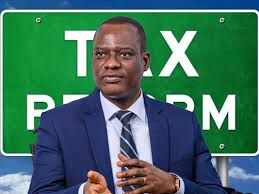The highly anticipated student loan program is set to commence this Friday, with 1.2 million students from federal tertiary institutions across Nigeria slated to benefit, according to Akintunde Sawyerr, Managing Director/Chief Executive Officer of the Nigeria Education Loan Fund.

Program Launch and Beneficiary Details
During a pre-application sensitisation press conference in Abuja on Monday, Sawyerr revealed that the initial phase of the program would benefit students in federal universities, polytechnics, colleges of education, and technical colleges.
According to data from the National Universities Commission website, Nigeria has 226 federal tertiary institutions, including 62 universities, 41 polytechnics, 96 monotechnics, and 27 colleges of education.
President Bola Tinubu signed the Student Loans (Access to Higher Education) Act (Repeal and Re-Enactment) Bill, 2024, into law on April 3. This followed separate considerations by both the Senate and the House of Representatives, based on the report from the Committee on Tertiary Institutions and the Tertiary Education Trust Fund.
The executive bill, titled, “A bill for an Act to repeal the Students Loans (Access to Higher Education) Act, 2023 and Enact the Student Loans (Access to Higher Education) Bill, 2004 to Establish the Nigerian Education Loan Fund as a body corporate to receive, manage and invest funds to provide loans to Nigerians for higher education, vocational training and skills acquisition and related matters,” was signed in the presence of National Assembly leaders, ministers, and key education stakeholders.
Key Features of the Act
The Act empowers the Nigeria Education Loan Fund to offer loans to eligible Nigerian students to cover tuition, fees, charges, and upkeep during their studies in approved public tertiary institutions and vocational and skills acquisition centers.
One significant change in the new law, which repeals the 2023 Student Loan Act, is the removal of the family income threshold, allowing more students to apply for loans and assume responsibility for repayment according to the Fund’s guidelines.
Ensuring Access to Education
After signing the bill, President Tinubu emphasized that no Nigerian, irrespective of their background, should be excluded from receiving quality education. “This is to ensure that no one, no matter how poor their background is, is excluded from quality education and the opportunity to build their future,” said the President at the State House in Abuja.
The scheme, initially announced to launch in September, faced several delays, leading to its indefinite postponement. The Presidency attributed the delay to Tinubu’s directive to expand the scheme to include loans for vocational skills.
Last Thursday, the Nigerian Education Loan Fund announced May 24 as the official date for opening the loan application portal.
Application Process and Requirements
Sawyerr encouraged students in federal tertiary institutions to visit the website, www.nelf.gov.ng, to apply starting May 24. He added that students in state universities and vocational skills centers could apply at a later date. Applicants need to provide their admission letter from the Joint Admissions and Matriculation Board, National Identity Number, Bank Verification Number, and completed application forms from the website.
“The loan application process has been streamlined to ensure easy access for all eligible students in federal tertiary institutions. Applicants can access online support to assist with any questions or concerns during the application process,” he said. “We believe that education is a vital investment for the future. The student loan initiative of Mr. President is a testament to this commitment.”
One key feature of the program is the absence of physical contact between loan applicants and NELFUND. The portal is designed to be user-friendly, allowing students to submit their loan applications conveniently. Sawyerr encouraged students to take advantage of this opportunity to secure the necessary financial assistance for their education and to submit their applications promptly for timely processing.
In addition to the interest-free loan, applicants will also receive monthly stipends for upkeep. However, the exact amount will be capped, and decisions will be made based on various factors regarding what fees will be paid. Sawyerr clarified that institution fees would be paid directly to the institutions, not the students, and only for one session at a time to account for possible changes in student status.
Role of Institutions and Security Measures
Institutions are expected to play a crucial role by providing the Fund with data on fees payable by students at different levels. Sawyerr also mentioned that the agency is working with security agencies to prevent fraud in the application process.
Call for Responsible Use of Funds
In a related development, the Federal Government has urged state governments to ensure responsible and transparent use of the matching grants allocated for the Universal Basic Education Commission (UBEC) program. UBEC Executive Secretary Dr. Hamid Bobboyi made this call during the inauguration of a six-day training program for accountants and auditors from UBEC and State Universal Basic Education Boards in Abuja.
Bobboyi emphasized the importance of integrity among financial officers and the need to resist undue pressure from state officials to avoid compromising standards. “The training aims to update participants on the revised accounting manual and to provide a comprehensive understanding of financial infractions and sanctions,” Bobboyi stated. “This knowledge is essential for ensuring effective service delivery in basic education.”
Highlighting the mandates of UBEC and SUBEBs in implementing the Universal Basic Education program, Bobboyi stressed the need for a robust accounting system to ensure the judicious use of government funds and adherence to accountability standards regarding the management of the Federal Government’s UBE Intervention Fund.
To enhance professional competence among UBEC and SUBEB staff, continuous training is necessary. Despite previous efforts, there has been limited improvement in financial practices, as evidenced by poor record-keeping and infractions against established guidelines found during regular quarterly financial monitoring by UBEC. These findings and recommendations have been communicated to SUBEBs for corrective actions.
Bobboyi urged finance officers to comply strictly with government regulations and warned against engaging in or condoning wrongdoing, as reports from UBEC’s financial monitoring could be requested by compliance agencies.
Adamu Misau, UBEC’s Director of Finance and Accounts, noted that a new sanction regime developed in 2022 had been approved for implementation. The delay in its implementation was to ensure adequate training for all financial managers. Misau concluded, “We expect that by the end of this training, financial officers will be better prepared to manage the FGN-UBE Intervention Funds responsibly, adhering to financial regulations and due process.”
Read also:
- Air Peace Responds to Safety Concerns Following UK Allegations
- Port Harcourt Refinery Set to Begin Operations in July
- Federal Institutions First to Benefit from Student Loans, Says FG
- UK Regulator Reports Air Peace for Alleged Safety Violations
- World react to Iran President Raisi’s death
- NNPCL and Lagos Fire Service at Odds Over Depot Fire
- “Nigeria Doesn’t Deserve Royal Visit,” UK Journalists Criticize Harry & Meghan for Visiting Nigeria
- “His Mom Suffocates Him” – Oritse Femi Discusses Burna Boy and His Mother Bose Ogulu’s Relationship
- “Is it for eba?” – Broke Lady Mocks ‘Helper’ Who Sent Her N20K
- Tinubu Approves Payment of N3.3tn Power Sector Debts
- “I Wanted to Be a Catholic Priest; I’m Returning to My Roots” – Cubana Chief Priest Vows to Turn Over a New Leaf
- AMVCA 2024: Funke Akindele, Toyin Abraham, Other Celebs Turn Heads With Outfits at Award Ceremony
- How to identify when a child is being bullied



